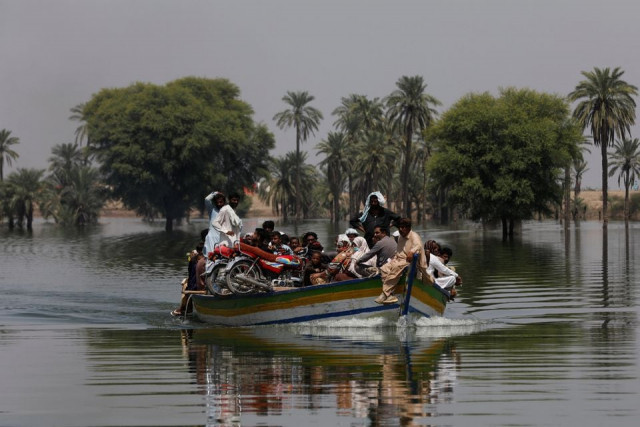Monopoly pricing : With roads swamped, boatsmen making money
Most of rural Sindh is still cut off from bigger cities and villagers are forced to pay big to access them

While the torrential rains might have stopped most of rural Sindh still remains inundated and where once buses used to ply the roads, boats have taken over leading to a helmsmen monopoly, which charges exorbitant fares.
Boat owners, who used to be fishermen prior to the monsoon flooding, have come to the conclusion that given the fact that no other method of travel will be available for a while, transportation is a lucrative business model for now.
“Each person has to pay Rs 500 to Rs 600 as boat fare for a round trip to Sehwan,” informed Mohammad Ali Raza who lives in Bobak town adjacent to Manchar Lake. According to Raza, the people travel to nearby towns especially Sehwan to get rations, drinking water, and to avail healthcare facilities.
“The Indus Highway from Bhan Saeedabad to Sehwan is under water. Similarly, the floods have inundated the highway from Johi to Mehar. Almost all the areas around us look like the sea now, so we have no other choice but to travel by boat.” This lack of choice has led to people like Abdul Haq Mallah, a boat captain who originally belongs to Badin district to make the nearly 6 hour journey to Johi tehsil, to make money. Mallah is currently charging Rs 100 per person from Johi town to dry land and he feels the one-way fare is justified. “The water is 6 to 10 feet above the land. It is an 8 kilometre boat ride from Johi town to dry land,” the helmsman informed, adding that he charges those travelling with bikes or other belongings, double. When asked how much money he has been making, Mallah informed that he works nearly all day and is able to make Rs 5,000 to Rs 6,000 daily.
Despite the high fares, Mallah is not short of people wishing to avail his services. As per Yasin Rind, who lives in Johi town, this is because thousands stayed back to save their town from the flooding and now they travel to get daily use items. “After the 8 kilometre journey, the boat reaches a dry patch of land from where people can get rickshaws and taxis.” Some 65 kilometres away from Johi, Mashooq Chandio, a resident of Thallo village of Khairpur Nathan Shah tehsil, informed that the boat fares in their area were steep too. “Despite the chest deep water, we have not left our village. We are currently using boats to travel but a Rs 300 fare for one side is not affordable at all,” lamented Chandio, adding that the boat ride to their village from the nearest town took about an hour.
However, for those who cannot afford the high fares, travelling on foot in the deep water is the only choice. Iman Zadi Shaikh, local body representative of KN Shah town, commenting on the plight of people who have to risk their lives by walking to nearby towns, said, “it is the government’s responsibility to provide transport to flood victims free of cost, but it has utterly failed.” Shaikh, who is associated with the Sindh’s ruling party, Pakistan People’s Party (PPP), criticised her own government for ignoring the people in the calamity. “People are hungry and animals are dying due to lack of fodder and outbreak of diseases. While everyone is struggling the government is nowhere to be seen,” Shaikh said while talking to The Express Tribune.
Published in The Express Tribune, September 26th, 2022.



















COMMENTS
Comments are moderated and generally will be posted if they are on-topic and not abusive.
For more information, please see our Comments FAQ